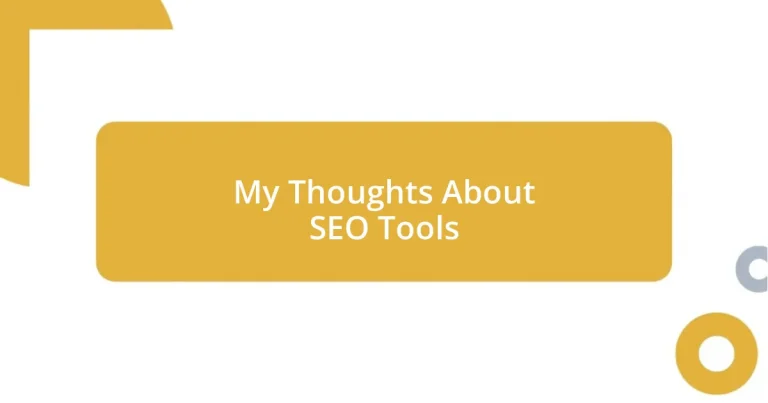Key takeaways:
- SEO tools are essential for effective content creation and strategy refinement, making the process more data-driven and insightful.
- Key features of SEO tools include user-friendly interfaces, comprehensive reports, and responsive customer support, all of which enhance usability and insight accessibility.
- Both free and paid SEO tools have their advantages; free tools are good for beginners, while paid tools offer deeper insights and functionalities.
- Common mistakes with SEO tools include relying on a single tool, neglecting updates, and overlooking valuable analytics, which can hinder effective strategy development.
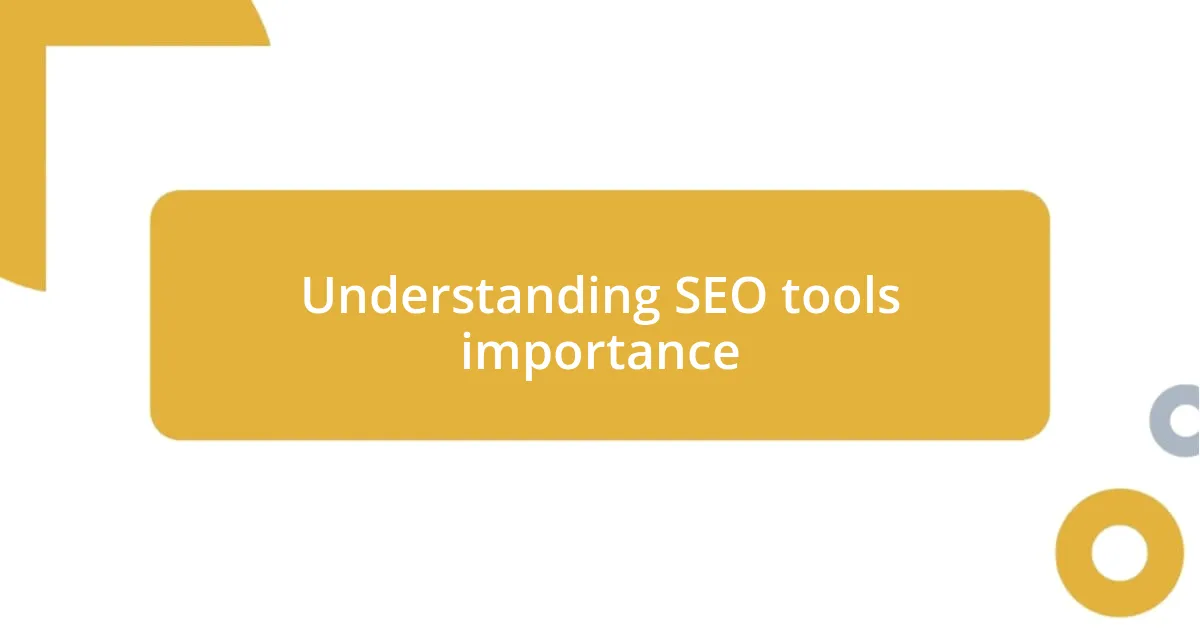
Understanding SEO tools importance
When I first dived into the world of SEO, I quickly realized how crucial tools are for navigating the vast online landscape. I remember feeling overwhelmed by the data available, but with the right SEO tools, it became easier to pinpoint what our audience was searching for. Can you imagine trying to find your way in a new city without a map? That’s what tackling SEO without these tools feels like.
Using SEO tools not only saves time but also enhances the quality of content creation. For instance, once I started utilizing keyword research tools, the clarity in my writing improved tremendously. I could tailor my content to directly address what people were curious about, fostering a stronger connection with my audience. Isn’t it amazing how data can inform our creative processes?
Moreover, tracking performance metrics with SEO tools opened my eyes to what truly resonates with readers. The first time I analyzed a report and saw the uptick in organic traffic, I felt an exhilarating mix of pride and validation. Reflecting on this, how could anyone underestimate the importance of these tools in refining strategies and achieving sustainable growth?
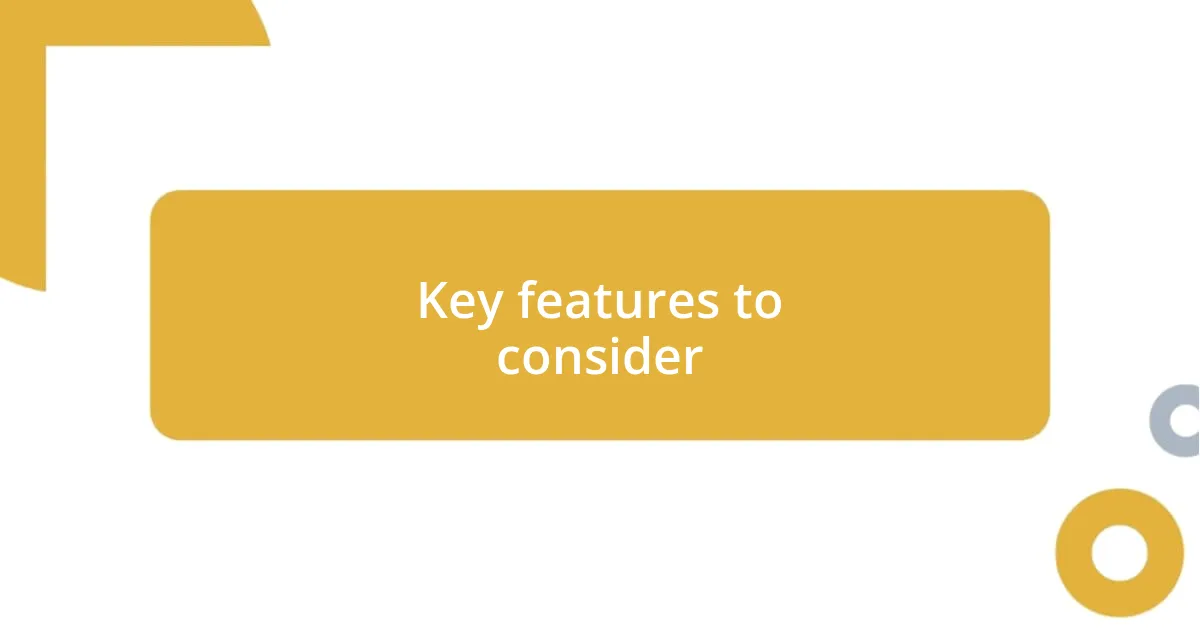
Key features to consider
When considering SEO tools, one key feature that stands out to me is user-friendly interfaces. I remember my first experience with a complicated tool, and it was like trying to read a foreign language. I quickly realized that if I couldn’t navigate the tool efficiently, I’d miss out on valuable insights. A well-designed interface not only saves time but also allows for a more seamless exploration of the features, making the learning process enjoyable.
Another essential feature is the variety of reports and analytics provided. I have often found myself analyzing data and discovering trends I never anticipated. For instance, when I uncovered new keywords that aligned with my audience’s interests, it felt like striking gold. Such insights empower you to refine your strategy based on concrete data rather than guesswork.
Lastly, excellent customer support can’t be overlooked. I’ve had moments when I was completely stuck, and a responsive support team made all the difference. I remember reaching out with a question late at night and receiving a helpful response almost immediately. Tools should not only empower but also support you through challenges, making your SEO journey smoother.
| Feature | Why It Matters |
|---|---|
| User-friendly interface | Enables seamless navigation and quicker learning. |
| Variety of reports and analytics | Provides actionable insights to optimize strategies. |
| Customer support | Offers assistance during challenges, ensuring a smoother experience. |
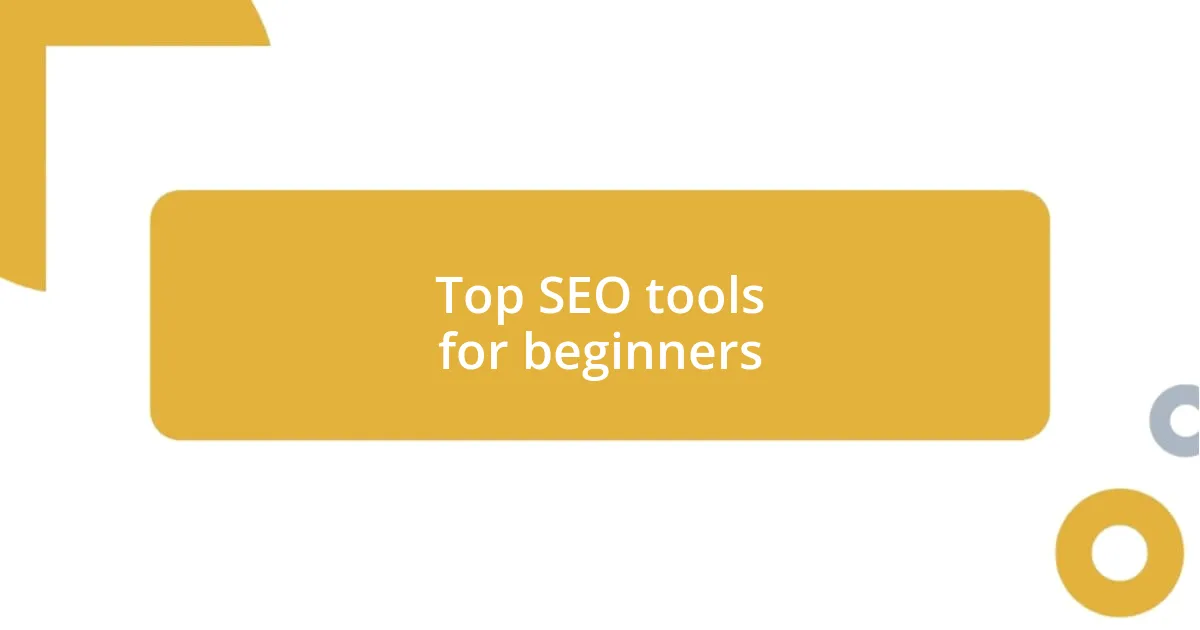
Top SEO tools for beginners
As I began my SEO journey, a few tools truly stood out for their accessibility and effectiveness. Tools like Google Analytics were game-changers for me, not just for tracking traffic but for understanding user behavior in a way that felt almost intuitive. Connecting the dots about where visitors came from and how they interacted with my content offered me vital insights that reshaped my approach.
- Google Analytics: Ideal for beginners; it tracks website traffic and user behavior.
- Ubersuggest: A straightforward keyword research tool that suggests keywords and competitor insights.
- Yoast SEO: A plugin that simplifies on-page optimization for WordPress sites, making SEO manageable.
- MozBar: Offers a quick overview of the SEO metrics of any webpage, perfect for learning on-the-go.
Another tool that really resonated with me was AnswerThePublic. I fondly remember spending an afternoon typing in various queries, and I was amazed at how it unveiled the questions people were asking about my niche. It felt like having a direct line to my audience’s thoughts, which empowered me to create content that directly addressed their needs and curiosities.
- AnswerThePublic: Generates content ideas based on real user questions.
- SEMrush (Free version): Offers essential keyword tracking and website auditing features.
- Google Search Console: A must-have for checking indexing status and optimizing visibility.
- Canva: While not strictly an SEO tool, creating visually appealing graphics can enhance your content’s shareability.
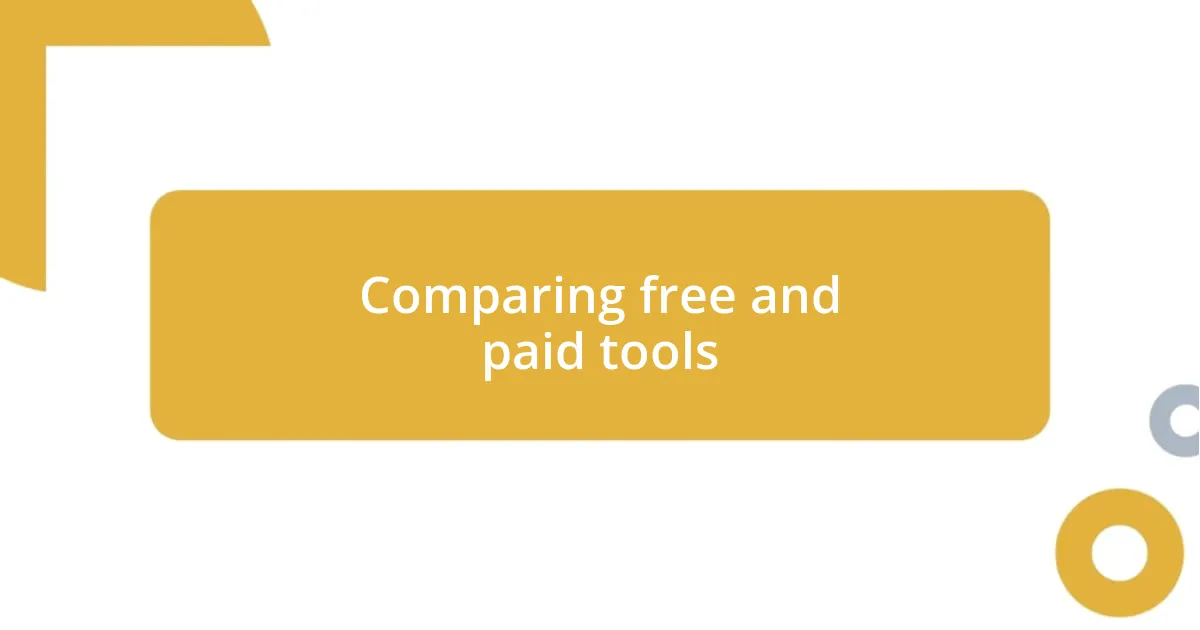
Comparing free and paid tools
When it comes to SEO tools, I often find myself torn between free and paid options. I remember when I was just starting out and relied heavily on free tools like Google Search Console. While they provided a solid foundation, I sometimes felt frustrated by their limitations—especially when I needed more in-depth analysis. Have you ever faced the same challenge?
On the flip side, investing in a paid tool like Ahrefs transformed my approach to SEO. The depth of insights and extensive features were like upgrading from a bicycle to a sports car. I vividly recall the first time I discovered intricate backlink profiles and keyword gaps that I never would have found with free tools. That moment opened up a pathway to opportunities I didn’t know existed.
While free tools are undoubtedly a great starting point, they often lack the advanced functionalities that paid solutions offer. I once conducted a competitive analysis with a free tool only to find it barely scratched the surface. Imagine having a treasure map for your SEO strategy vs. just wandering without guidance—that’s how I felt when I shifted to a paid tool. In my experience, it’s about weighing the investment against the value you’ll gain for your unique needs.
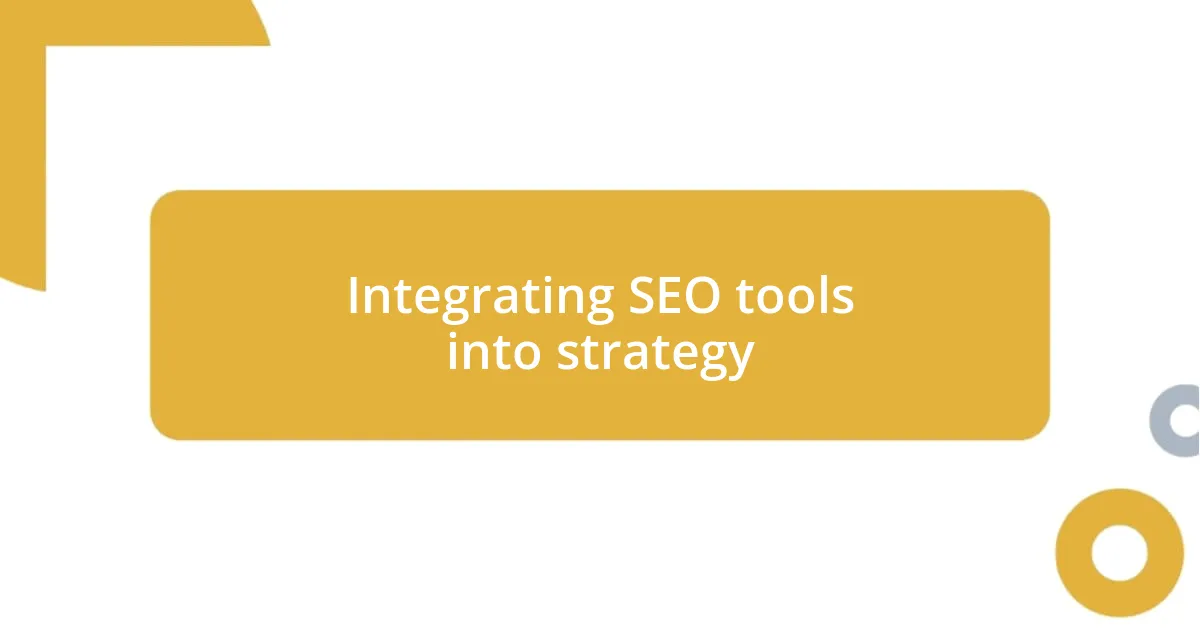
Integrating SEO tools into strategy
Integrating SEO tools into your overarching strategy is essential for maximizing their potential. I recall one project where I took the plunge and combined Google Analytics with SEMrush. It was fascinating to see how these tools worked together; Google Analytics provided invaluable traffic insights, while SEMrush filled in the gaps with keyword and competitor data. Have you ever experienced that “aha” moment when everything falls into place? It’s genuinely empowering.
The key to effective integration lies in understanding how these tools can complement each other. For example, I often use Yoast SEO for on-page optimization, and then I cross-reference my findings with Ubersuggest’s keyword suggestions. This dual approach not only refined my content but also helped me create more targeted strategies. It feels like having a toolkit where each tool serves a specific purpose, leading to a more cohesive SEO strategy.
One of my favorite strategies is setting specific goals and tracking them with tools like Google Search Console. I remember a time when I set out to improve my website’s visibility for long-tail keywords. By continuously analyzing my progress through Search Console, I could see which keywords were driving traffic and adjust my content accordingly. It’s thrilling to watch your efforts pay off in real-time! Have you ever set a goal and watched your SEO strategy evolve as a result? Integrating these tools made that journey much more enjoyable and effective.
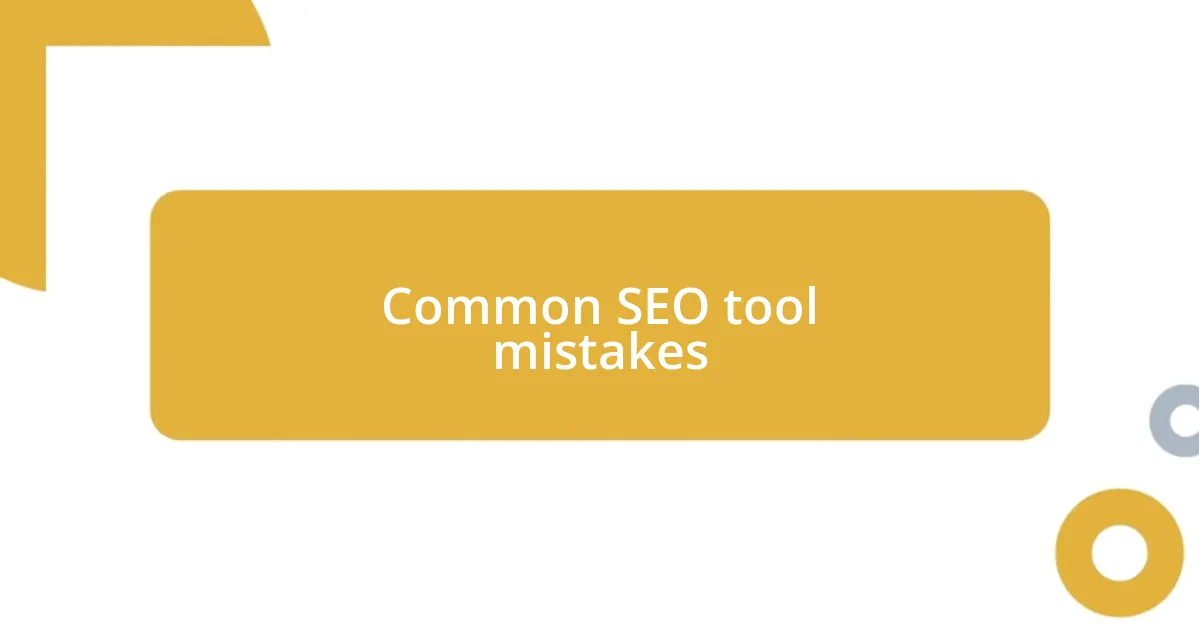
Common SEO tool mistakes
I’ve noticed many folks falling into a common trap: relying solely on one SEO tool for all their needs. I remember a time when I became overly dependent on a single tool for keyword research, thinking it had all the answers. The reality hit me hard when I discovered keywords that weren’t even in its database. It was like finding out I missed a whole party while I was stuck in a corner. Have you ever relied on just one tool and later realized you were missing out?
Another frequent mistake is ignoring the need for regular updates. SEO tools evolve, and so should your strategies when using them. Once, I neglected to update my preferred tool’s settings, only to find that my data was outdated and misleading. It felt like navigating with a broken compass, leading to misguided decisions. Can you imagine making critical SEO choices based on flawed information?
Lastly, many users forget to dive into the analytics that these tools offer, treating them as merely a reporting mechanism. Early in my journey, I often overlooked the wealth of insights hidden in the analytics section, thinking it was just fluff. When I finally took the time to explore those reports deeply, it was a game changer. The nuance of user behavior and keyword performance gave me clarity I hadn’t anticipated. Have you ever hesitated to explore the depths of your tools and later found valuable insights?
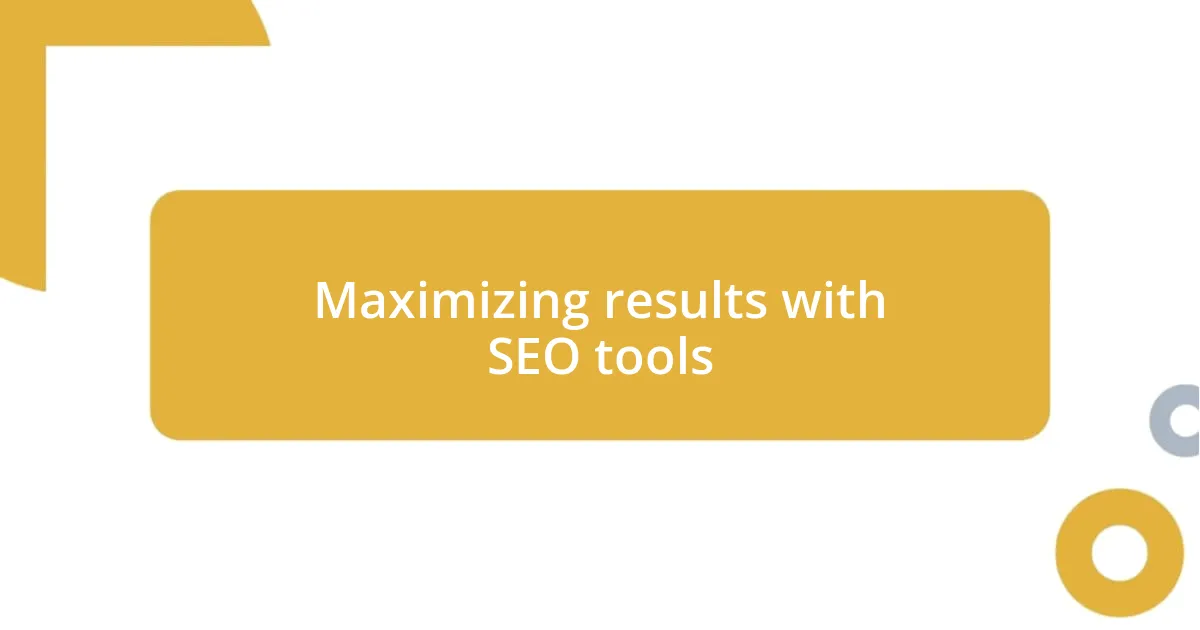
Maximizing results with SEO tools
Maximizing results with SEO tools is all about harnessing their full potential through thoughtful application. I once invested time into refining my site’s metadata using Moz, and the surge in organic traffic was exhilarating. Isn’t it amazing how a few tweaks can lead to noticeable results? It’s like giving your website a fresh coat of paint that catches the eye of visitors and search engines alike.
Another area where I’ve seen significant gains is through competitive analysis. By using tools like Ahrefs, I could dissect my competitors’ backlink profiles and uncover new opportunities. I vividly remember discovering a high-authority site that linked to one of our competitors but not to us. It felt like striking gold! Have you explored your competitors’ strategies to identify gaps in your own? Those moments of realization can fuel innovative strategies, pushing you ahead in the game.
I’ve also learned the importance of testing and experimentation with these tools. Not long ago, I decided to experiment with different keyword variations in Semrush to see which resonated with my audience the most. The process involved a bit of trial and error, but the insights I gathered shaped the content that actually connected with my readers. Isn’t it rewarding when your efforts result in content that truly reflects what your audience is searching for? Embracing this trial-and-error mindset can truly amplify your SEO success.
